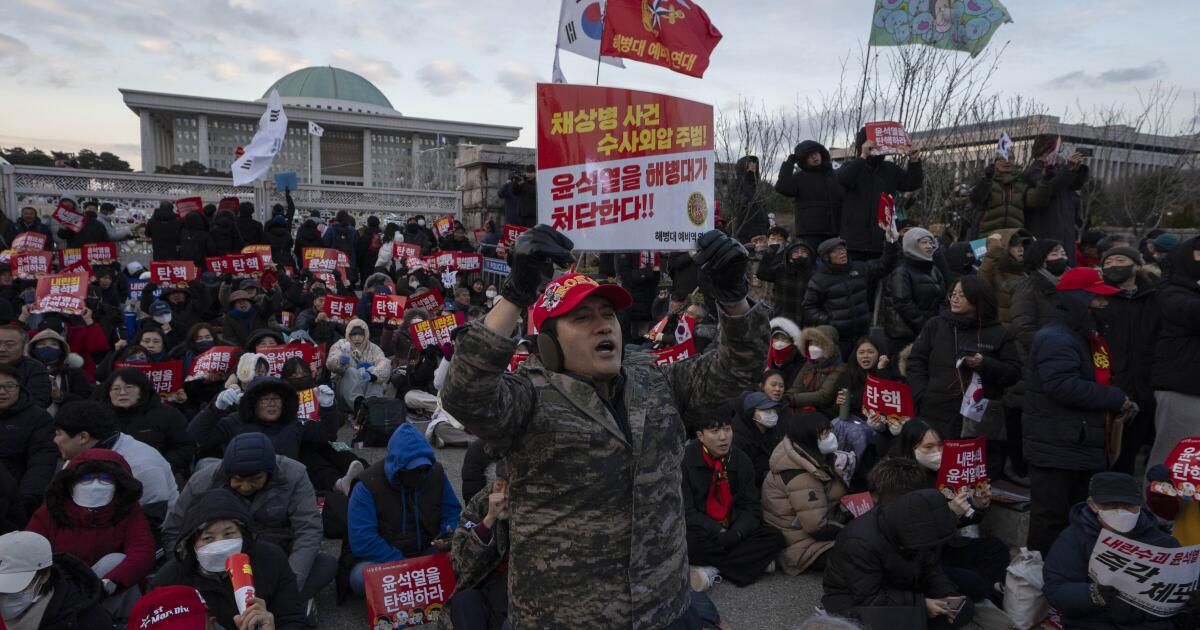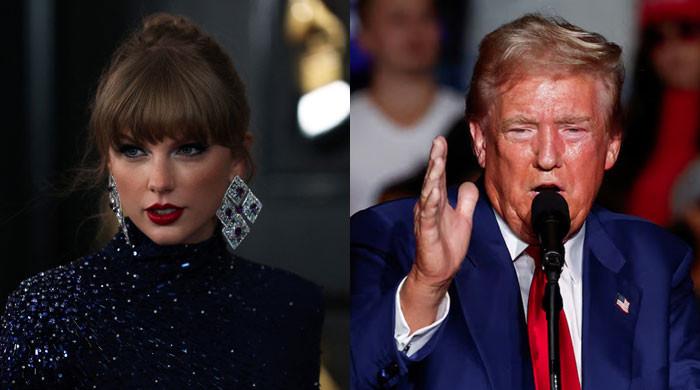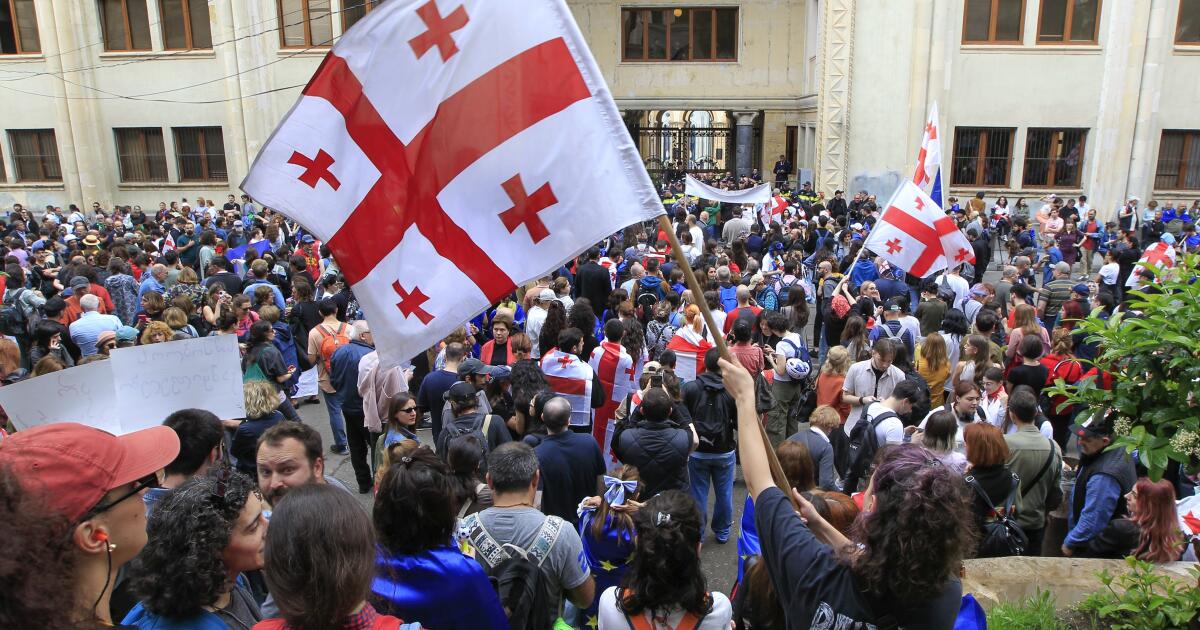SEOUL— South Korean President Yoon Suk-yeol, who shocked the world this week by declaring martial law, narrowly avoided impeachment as lawmakers from his party boycotted a parliamentary vote on his impeachment on Saturday.
The motion by opposition legislators accused him of insurrection and described his decree as an unconstitutional self-coup.
“The president has betrayed the trust of the people and has lost the right to conduct state affairs,” the impeachment motion said.
In Seoul, South Korean National Assembly Speaker Woo Won-shik bangs his gavel to announce that a vote to impeach President Yoon Suk-yeol could not be held because a quorum was not reached.
(Jeon Heon-kyun / Associated Press)
Thousands of protesters had gathered outside the National Assembly to celebrate his dismissal. Protests are now expected to increase.
“We will not give up. We will prevail,” liberal opposition leader Lee Jae-myung said after the motion failed. “For Christmas, we will bring people the end-of-year gift of restoring the country to normal.”
The Liberal party said it would table the motion again in the next parliamentary session on Wednesday, and every week afterward until it is passed. The question is whether enough members of Yoon's conservative ruling party will vote to oust him while he still has two and a half years left in his term, potentially ceding the presidency to the liberal opposition.
Impeaching Yoon requires the support of at least two-thirds of the 300-member National Assembly, or 200 votes. Because the opposition coalition has 192 seats, impeachment requires eight or more votes from Yoon's conservative People Power Party.
In the days after martial law was declared, a handful of ruling party lawmakers had indicated they would at least consider impeachment. But only three of them showed up for Saturday's vote, and the remaining 105 left the plenary hall in protest.
Outside the National Assembly, the crowd gathered to call for Yoon's ouster let out a cry of frustration.
Among them were citizens who had traveled from hours away and college students studying for exams in the crowd while keeping an eye on the news.
“Arrest Yoon Suk-yeol!” they chanted as they marched down the boardwalk.
Declaring martial law on Tuesday, Yoon lashed out at the opposition-controlled National Assembly, which he accused of being a “den of criminals” and North Korean sympathizers.
General Park An-su, whom Yoon appointed as his martial law commander, subsequently suspended all political activity and declared the media under military control. For many in South Korea, the move was eerily reminiscent of the country's past military dictatorships.
But three hours after Yoon's decree, lawmakers (many of them scaling the doors of the closed National Assembly) voted unanimously to overrule Yoon, demanding that he lift the decree.
In a two-minute address to the nation on Saturday morning, Yoon apologized for upsetting the public and said he had been motivated by “desperation.”
While Yoon reportedly told his officials and party members that his decree was intended to send a message to an adversarial legislature (which has filed numerous impeachments against his appointees and taken steps to investigate his wife on charges of corruption and stock manipulation), many, including his own, Party members say they believe he had much more sinister motives.
Han Dong-hoon, leader of the People Power Party, said there were signs that the special forces soldiers who had stormed the National Assembly were carrying out orders to arrest him and other lawmakers. Opposition leader Lee, whom Yoon narrowly defeated in the presidential election two years ago, has said the same.
“We have confirmed that President Yoon ordered the arrest of senior politicians on the grounds that they were anti-state forces,” Han said at a party meeting on Friday.
“I don't think we can pretend like nothing happened.”
While stating that this was based on “credible” sources, Han did not elaborate, simply offering that these plans would be made public in due course “through various channels.”
In a meeting with Han that same day, Yoon denied giving such an order, Han said.
Hong Jang-won, a senior official at the National Intelligence Service, the country's spy agency, told lawmakers on Friday that Yoon called him to order the arrest of several lawmakers, including party leaders Lee and Han. The chief of spies, Cho Tae-yong, has disputed Hong's accusations.
However, even as they condemned the declaration of martial law as unconstitutional and recognized that Yoon must ultimately be removed from office, Han and most of his party's allies opposed impeachment.
For South Korean conservatives, impeachment is their exposed nerve and they have reason to tread carefully.
The first and only South Korean president to be successfully impeached was conservative Park Geun-hye, who was later investigated and imprisoned on corruption charges. His fall divided the conservative camp and paved the way for liberal successor Moon Jae-in, whose tenure conservatives refer to as “the lost five years.”
Crucial to the success of Park's impeachment was a bloc of conservative legislators who joined the opposition to vote in favor.
That is why many party stalwarts are determined to avoid the same fate this time.
“We cannot allow more traitors to surrender to the enemy, as happened with Park Geun-hye,” Daegu Mayor Hong Joon-pyo wrote on social media on Wednesday.
Instead, members of Yoon's party have proposed more moderate solutions that would lead to Yoon's “orderly resignation,” such as revising the constitution to shorten Yoon's term, transferring some of his presidential powers to the prime minister, or forming a cabinet. bipartisan.
In his recent public speech, Yoon said he would leave his fate to the party, hinting that he could cede much of his authority to Han, should he avoid impeachment.
The liberal opposition has rejected any alternative to impeachment and called Yoon a “time bomb.”
“He is in a very worrying state of mind at the moment. We don't have time to discuss something like 'an orderly resignation,'” liberal party spokesman Yoon Jong-kun told reporters Saturday morning.
“Only Yoon's immediate removal from his official duties and his impeachment can alleviate the people's anger and the plummeting of South Korea's international credit rating.”
The Liberal party has said it will propose the motion again on Wednesday.
“We are going to propose it repeatedly,” Lee Jae-myung said, “until it is approved.”












